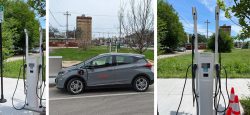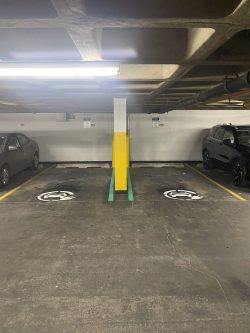
ComEd reaches another milestone in its mission to advance the equitable adoption of electric vehicles (EVs), with the completed installation of two new EV charging stations on Chicago’s South Side. Funded in part by a competitive United States Department of Energy (DOE) grant, ComEd installed a total of five EV charging stations near multi-unit dwellings (MUDs), including a curbside location near current and future condominium buildings, a college parking lot, and a condominium parking garage. The grant targeted MUDs, or residential properties with three or more units, as part of a pilot effort to boost access for those who don’t have charging at home or live in charging deserts.

The buildout of the first of five commissioned EV charging stations began in April of 2022 as part of a DOE study to see how expanding access to charging may support more customers in making the switch to EVs – particularly those who reside in areas with high concentrations of greenhouse gas emissions (GHGs) and would benefit most from the lower maintenance and fuel costs of owning an EV. Since the completion of the MUD curbside charging station in Chicago’s Bronzeville neighborhood at 43rd Street and Calumet Avenue, an area with high levels of GHGs, ComEd has noticed a growing number of EV drivers taking advantage of its accessibility. Through the end of 2022, 88 different drivers used the station for the first time. Last year, another 188 unique users logged over 1,700 charging sessions. Today, a charging station with two charging ports is located in the parking lot at the Illinois College of Optometry in Chicago’s Douglas neighborhood, and another is located in a private parking garage for residents of a Hyde Park condominium located near Chicago’s Museum of Science and Industry.
 ComEd’s Smart Grid team is at the helm of designing innovative clean energy solutions for customers. “The first EV charging station installed was the first on a public right-of-way street in the state of Illinois and now going into its second full year of operation it’s proving to be very popular,” said Melvin Nicks, ComEd Smart Grid senior program manager. “With the help of the DOE grant, we will continue to monitor charging trends and patterns to help inform future charging programs.”
ComEd’s Smart Grid team is at the helm of designing innovative clean energy solutions for customers. “The first EV charging station installed was the first on a public right-of-way street in the state of Illinois and now going into its second full year of operation it’s proving to be very popular,” said Melvin Nicks, ComEd Smart Grid senior program manager. “With the help of the DOE grant, we will continue to monitor charging trends and patterns to help inform future charging programs.”
Expanding zero emissions transportation options is a key focus of ComEd’s beneficial electrification plan, an investment strategy to support the adoption of decarbonization technologies, and is designed to provide benefits to all, especially environmental justice communities (EJCs) which have been most affected by climate change and pollution. A recent American Lung Association study found that the widespread electrification of transportation has the potential to significantly improve air quality and therefore public health – preventing 5,410 premature deaths, 138,000 asthma attacks, and 670,000 lost workdays for Illinois residents by 2050. More EVs on the road will provide health benefits for community members like those who reside on Chicago’s South Side.
With Illinois’ goal of 1 million EVs on state roads by 2030 and more than 90,000 EVs already registered statewide, 80,000 of them driving in ComEd’s service territory, ComEd is supporting the growing adoption of EVs by readying and incentivizing charging infrastructure, empowering customers with information and resources, and even offering over $90 million in recently-launched rebates to offset the upfront costs of going electric, with at least half of all funding reserved for equity-eligible customers and communities, those who may face the biggest barriers in to transitioning to EVs.
“Installing the first charger in the heart of an EV charging desert is very symbolic because it not only serves EV owners who live in multi-family buildings, locations most difficult to reach with charging infrastructure, but it shows community members interested in driving an EV that more charging stations are coming,” said Billy Davis, general manager for Jitney EV and a member of the Bronzeville Community of the Future Advisory Council. “Investments in the equitable expansion of EV charging on Chicago’s South Side will empower communities most impacted by climate change and pollution with both economic development and greater access to clean transportation.”
Though the ComEd-DOE pilot has wrapped up construction, it’s just the start of innovative efforts across northern Illinois to leverage ComEd’s nation-leading reliability to support customers who are increasingly turning to EVs. To further support expanding access to EV charging and to help customers plan for their switch to EV, ComEd offers a free web-based EV Toolkit that helps calculate the potential cost savings of making the switch. To learn more about ComEd rebates, the EV Toolkit, and more visit ComEd.com/ev.
